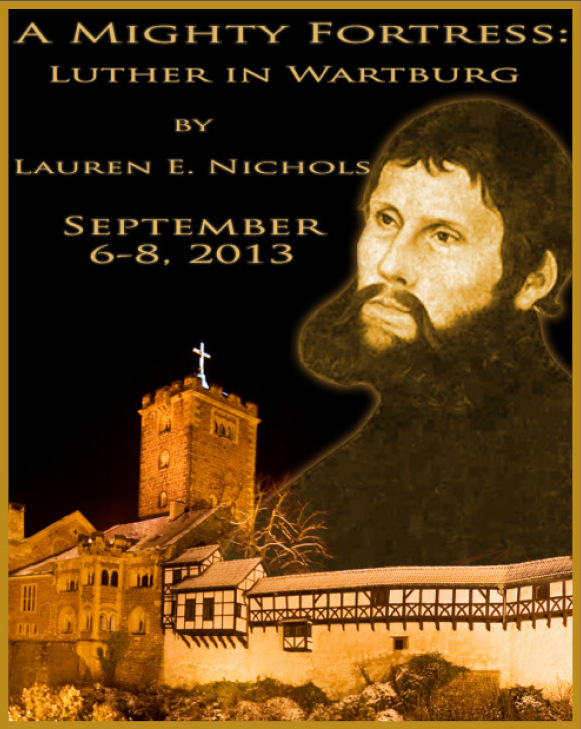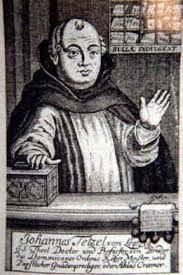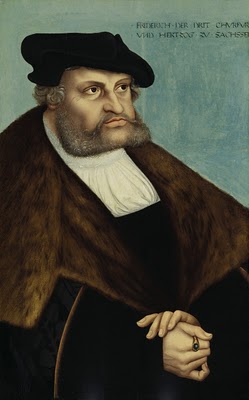Famous People You Need to Know
 Here are short descriptions of the main historic figures referred to by Luther in A Mighty Fortress.
Here are short descriptions of the main historic figures referred to by Luther in A Mighty Fortress.
Knowing a bit about them in advance will definitely help you to appreciate the events more thoroughly. There are also some historic terms–some of which are defined within the entries on people:
HISTORIC PEOPLE AND TERMS FOR YOU TO KNOW:
Indulgence: the transfer of “superfluous merit” to those in need, made by decree of the Church, particularly the Pope. The “excess” goodness of Christ and the saints could be transferred to others to mitigate their punishment in purgatory. (It was sometimes claimed to provide forgiveness of sins themselves—as opposed to lessening of the sins’ penalty.) The Church was able to specify precisely how many years and days could be reduced from one’s penalty. Popes often pronounced a specific merit to be connected with the viewing of saints’ relics (bones or bone fragments). The payment of a sum of money often attached to granting of an indulgence, began during the Crusades, and had financed the building of many of the Gothic cathedrals, as well as other churches, monasteries and hospitals in the Middle Ages. Luther protested against the efficacy of indulgences, since forgiveness of sins is based on the true repentance of the believer—which can be determined only by God.
Prince Albert of Brandenberg (referred to in the play as Albert of Mainz): technically not old enough to be a bishop at all, he held two bishoprics already when he purchased the archdiocesan see (bishop’s domain) of Mainz in 1514. Mainz’ three previous archbishops had died within a ten-year period, and the diocese had no funds left for the installment of yet another successor. Albert had to pay the 10,000 ducat fee himself, and borrowed from money lenders—at a heavy rate of interest—for the purpose. In addition, Pope Leo, desperate for funds himself, imposed a fee for the irregularity of holding three bishoprics at once. Leo then granted permission for Albert to collect fees for a new indulgence, so that Albert could repay the money lenders.

Pope Leo X: pontiff, 1513-1522, member of the Medici family, notorious for his indolence and expensive tastes (including carnivals and gambling). The resources of three papacies were squandered during his reign. One Catholic historian described his ascent to Peter’s chair as “one of the most severe trials to which God ever subjected His Church.”

Tetzel: Dominican priest and experienced proclaimer of indulgences. Official “vendor” of the new indulgence dispensed by Albert in his territories. (The indulgence was not offered in Luther’s parish, because permission from the civil authority was required and Frederick—see below—forbade the sale of an indulgence which would compete with those of All Saints’ Day at Wittenberg.) The indulgence sales included a solemn procession, led by a standard bearer with a cross and the papal coat of arms, and the pope’s Bull (declaration) of Indulgence held aloft on a gold-embroidered velvet cushion.

Johann von Staupitz: vicar of Augustine order at Wittenberg. Professor, doctor of letters, held Chair of Biblical Studies at Wittenberg University. Luther’s mentor for several years, and instrumental in Luther’s taking over Staupitz’s chair at the University.
John Eck: professor at the University of Ingolstadt. Once a friend of Luther’s, he became an enemy after the publication of Luther’s Theses. Eck was a formidable debate opponent who traveled all over the Empire to defend various doctrines and dogmas of the Church. He enlisted Duke George‘s support of Leipzig as a challenger to Wittenberg University, for the sole purpose of debating Luther face to face.
Duke George: a Saxon prince and patron of Leipzig University. Moderator of a heated debate in 1519 between the universities of Leipzig and Wittenberg, where the chief opponents were John Eck and Martin Luther.

Jan Hus (1374 – 1415): Czech priest, teacher and preacher at Charles University at Prague. Like Wyclif in England, he stressed the authority of Scripture, the inability of popes and cardinals to establish doctrines which contradict Scripture, and the sole authority of God to forgive sin. After lengthy debates in Prague (which led to the excommunication of Hus and his followers in 1411), his case was referred to the Council of Constance in 1415. His safe-conduct from the Emperor was ignored and he was tried and burned at the stake in Constance, having had no opportunity to defend his views. Consequently he became a nationalist Czech hero, as well as an inspiration to others hungry for church reform. Luther’s enemies accused him of being a “hussite”; after Luther had read Hus, he agreed with them.
Cardinal Cajetan: Papal legate (representative) who granted Luther a personal hearing at the Diet (Imperial session) of Augsberg in October 1518. Luther had previously been cited to appear in Rome within 60 days, on charges of heresy. Luther’s appeal to Frederick produced the compromise meeting on German soil. Cajetan was disinclined to be moderate, inowing that both Emperior Maximillian and the Pope were furious with Luther’s writings. Cajetan had no intention of “wrangling” over the issues, or even defending the Church’s position. He simply wanted Luther to recant–i.e., to take back all the statements which were found to be offensive and heretical.
Charles V: of the House of Hapsburg. King of Spain already, he was elected emperor of the Holy Roman Empire in 1519, very much against Leo X’s wishes. His preoccupation with Spanish matters during ‘the first eighteen months of his reign delayed decisive action against Luther’s “dangerous heresy.”
Philip Melancthon: brilliant young professor of Greek at Wittenberg. At the age of 21, he already enjoyed a European reputation for his learning. Champion and outspoken defender of Luther’s theology.
